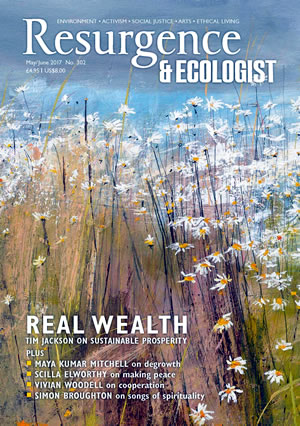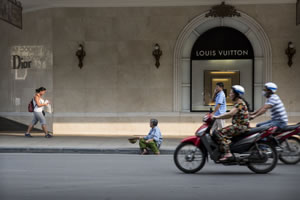A four-point plan to help alleviate global poverty and growing economic inequality has been put forward by Oxfam, after a report by the charity revealed that the world’s eight richest billionaires own as much wealth as the poorest half of the human population – 3.6 billion people.
The report, An Economy for the 99%, drawing on new data, shows that the world’s richest 1% own more wealth than the rest of humanity.
Oxfam says the inequality crisis is being fuelled by companies whose business models are more and more focused on delivering ever-higher returns to owners and senior executives. Such corporations are increasingly structured to avoid taxes, drive down workers’ wages and squeeze producers, instead of contributing fairly to an economy that benefits everyone.
Mark Goldring, chief executive of Oxfam GB – and a key speaker at last year’s One Earth, One Humanity, One Future conference marking the 50th anniversary of Resurgence – said: “This year’s snapshot of inequality is clearer, more accurate and more shocking than ever before… Inequality is not only keeping millions of people trapped in poverty: it is fracturing our societies and poisoning our politics.”
Oxfam is calling for a more human economy where markets – a vital engine for prosperity – are better managed in order to ensure that no one is left out or denied basic rights such as decent work, healthcare and education.
Key features would include:
Improved cooperation between governments to prevent tax dodging that costs poor countries at least US$100 billion every year
Government action to encourage companies to act for the benefit of their workforces and wider society as well as their executives and shareholders
Taxes on wealth to generate funds for health care, education and job creation
Action to tackle the barriers that hold back women, including lack of education opportunities and the burden of unpaid care work
The report highlights progressive business practices such as the Spanish corporation Mondragon – owned by its 74,000-strong workforce – which structures pay to ensure that the highest-paid employee earns no more than nine times the lowest-paid.
By contrast, Oxfam says, the average pay of a FTSE 100 chief executive in the UK is 129 times that of the average employee – and equivalent to the earnings of 10,000 people working in garment factories in Bangladesh.
While the number of people living in extreme poverty has decreased in recent decades, Oxfam says that 700 million more people could have escaped poverty if action had been taken to reduce the gap between rich and poor. Between 1988 and 2011 the incomes of the poorest 10% increased by just US$65, while the incomes of the richest 1% grew by US$11,800 – over 180 times as much.








